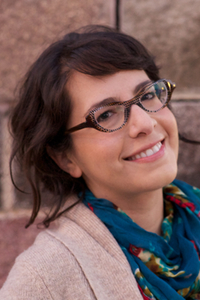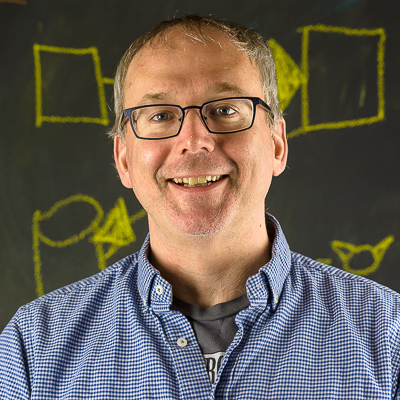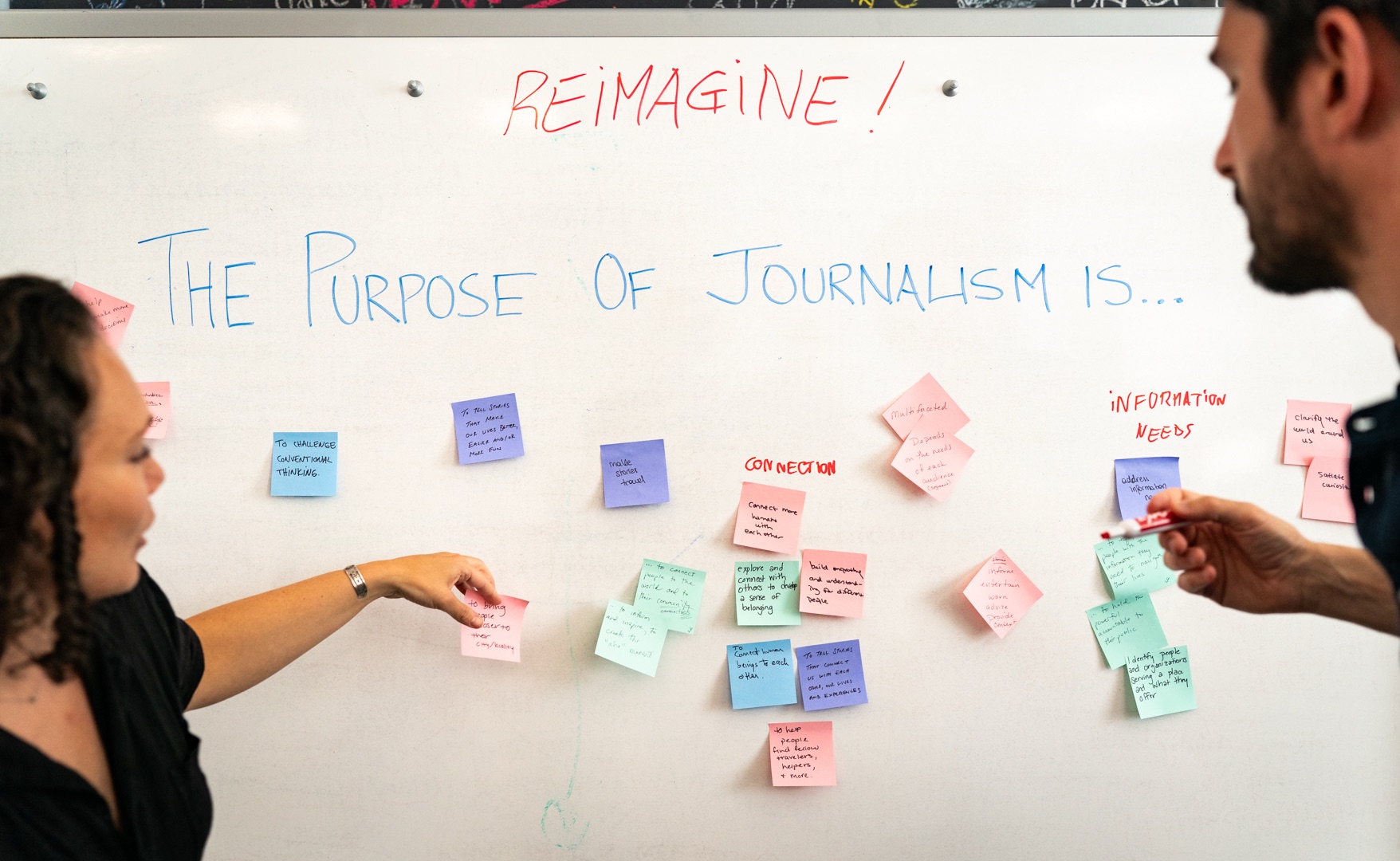Occasionally we'll do a Q&A with an impressive maker or strategist from media and its fringes. Each person brings a unique perspective on journalism, publishing and technology. Catch up and/or follow the series here.
If Jennifer Brandel is an "accidental journalist," it's a very happy accident. Brandel's Curious City project has become a thriving component of the audience engagement program at WBEZ, Chicago's public radio station. Recently, the Knight Foundation recognized the promise of Curious City with a grant to package the project's technology in hopes of making it easier to extend the program to new cities. Before joining WBEZ, Brandel was an editor and writer for Mule Magazine, and she co-founded the Chicago off-shoot of Dance Dance Party Party, a twice-weekly women-only freestyle dance party, along with an array of other projects, jobs, and adventures recounted below.

Who are you and what do you do?
I’m a curious (get ready to hear that word a lot) person, and as such I enjoy trying my hand at things I have no business doing. I’ve been a Tasmanian grape farmer, hair-stylist, psychometric test developer, ghost-writer for an exotic dancer, script doctor, forklift operator, music video director and now - an accidental journalist.
It’s not that I pretend to be an expert in anything, I just say “yes” and “I’ll give it a try” often. A few years ago I said yes when WBEZ called and said they were short-staffed and asked if I’d fill in as a general assignment reporter. I had filed all of one news spot in my life (but had done a fair amount of features) but said sure anyway.
A year later an opportunity to apply to a national initiative called Localore crossed my radar via The Association of Independents in Radio and the ask was amazing: basically, come up with an idea that pushes public media boundaries and if folks like it enough you’ll get a heap of money and a year to experiment in seeing it through. The idea I submitted was for Curious City and *spoiler alert* it got funded, and I’m thrilled that it’s being supported into the foreseeable future by/at WBEZ.
Curious City is basically a way of inverting the traditional power structure of journalism whereby the public gets to assign journalists stories. Folks submit their curiosities to our site, vote on them and we investigate the winners.Curious City is basically a way of inverting the traditional power structure of journalism whereby the public gets to assign journalists stories.
There are a couple additional twists: those who ask winning questions get to physically accompany reporters on their investigations and we do our best to show the process of reporting as it’s happening via “reporter’s notebooks” to both help us tap into the wisdom of our networks’/fans’ suggestions and sources as well as give audiences a behind-the-curtain view into how media is made.
What is your guaranteed-get-em-dancing jam for DDPP?
I'm working on a new mix right now and though this song isn’t new and I’m not a huge fan of one of the bands in the mash-up, it is undeniable. I dare you to listen and not move some part of your body.
How did you get involved in radio production?
Senior year at the University of Wisconsin I was en route to my favorite class with my favorite professor teaching on my favorite philosopher and a friend intercepted me and with quite a lot of urgency, said I had to skip my class and go to the student union to hear some dude I’d never heard of give a talk. There is absolutely no reason I should have gone, but for whatever reason I said yes.
That “dude” ended up being Ira Glass. I had never in my 21 years heard of public radio and his talk and the clips he played scrambled my still-forming brain. I ran out of notebook paper manically scribbling notes and ended up writing up and down my arms. Days later I began volunteering at WORT in Madison, and a few months later I send the most ridiculous, bizarre internship application to NPR. I wrote the address in my finest calligraphy and printed the thing on vellum paper and lo and behold the arts desk called me up and offered me an internship. That was the second in the three greatest strokes of luck that led me to public radio.
The third was moving to Chicago and meeting a fellow in a banjo class, who has since become my husband, who had connections at WBEZ. He introduced me to Jenny Lawton, who was kind enough to let me pitch her some stories (even though I really had no experience as a maker) and I started struggling my way through making features and got hooked. Eventually WBEZ started assigning me stories rather than me pitching them, which then led to the general assignment work.
What has been challenging about developing Curious City?
People, including myself, can get very attached to formats. If your brain is constantly trying to pick between seemingly infinite possibilities, well, it’s exhausting, terrifying and disorienting. And since Curious City essentially subverted all of our previous formats for how we approached and framed our reporting, that’s how the first few months of the project felt. Every decision we had to make had cascading consequences, each of which had to be thought through on content, editorial, design and logistics levels. We also had to build an entirely separate website than WBEZ.org because it could not easily accommodate the interactivity we were asking for.
Since those first six months of thrillifying experimentation, we’ve come to some general best practices but still every story, every reporter and member of the public present new situations and we still have so much to learn. I’m actually kind of dreading when things begin to feel formulaic in some sense, even if it’s a kick-ass formula, because I love this stage of gooey-centeredness, not-quite baked situations. But it’s been challenging — and luckily I’ve been working with an incredible team who have been equally excited and game for it.
What has been your biggest surprise?
The thing I still have to pinch myself about is that people “get it” so readily and they ask the exact kind of questions we were hoping to get. I set out in part to build a machine/model that would theoretically spit out the kind of stories that were my favorite: explainer/adventures that demystified a part of the world I’d always wondered about. The fact that the idea is working surprises me with every question we get and every story we do.The fact that the idea is working surprises me with every question we get and every story we do.
If I can give two … another big surprise is how much our reporters have gotten out of the experiences of working with the public one-on-one, face-to-face. I initially thought this project would most benefit our audience, giving them a unique, empowering opportunity and perhaps end up being kind of a drag for reporters used to having a certain level of protection and distance from the audience (not to mention the extra work of coordinating reporting with a stranger).
But I’ve heard it’s been really gratifying for reporters to connect and put faces and names to the folks who have been our mysterious, faceless, strictly numerical audience until now. Also: so many of the folks we’ve worked with have helped out tremendously in reporting and no doubt made our work stronger than it would have been without them.
Where is Curious City headed?
Hopefully it’ll multiply like public media mogwai around the country and there’ll soon be WGBH’s Curious City or KQED’s Curious City, etc. Thanks to a prototype grant from the Knight Foundation we’ll be re-packaging our site and making it exportable for other markets.
The hurdles for other newsrooms to pick up the model are significant, to be sure (between staffing and leadership), but we’re aiming to do everything in our power to make it as easy for them as possible. There’s no reason why it couldn’t work anywhere/everywhere else since the model is based around questions specific to a location/region. I have a not-so-secret desire to grow it to the point where we could do a national broadcast — whether that’s a collection of Curious City style stories from around the country or one question reported from the lens of various locations (e.g. what are you supposed to do with a deceased pet in Chicago/Reno/Burlington?). That’s a somewhat morbid example, but you get the idea.
What is the question you'd like to be asked more often?
Would you like this gift certificate for a back massage?
If you could change one thing about media today, what would you change?
I’d wave a wand and make it equally focused on what’s going well in the world and what’s not. Media (construed in the broadest sense) has an unmatched ability to spread information quickly, and it’s overwhelmingly used to spread information that I’m not convinced really serves humanity in a productive way.
I don’t use the “h” word often, but I really do hate the ugly division that persists between what’s seen as “hard news” and “soft news” (more derogatorily called “fluff”). I could write an essay here around how these divisions have gender implications — not good ones — and that it’s really more a problem with journalism shops and less with audience preferences.
I’m in no way in favor of cutting investigative and important journalism that impacts quality of life, policy, etc. and sheds light on the many dark places that need it. But I think there’s a huge middle space between what journalists see as hard or soft news and in that space is opportunity to create work that resonates with people and is timely/important to their understanding of the human condition/this time in history.
What's the last great thing you saw on the internet?
This comic about veterans’ moral injuries from war from the Public Insight Network (PIN) and Symbolia.
There’s a very slight chance I would have been attracted to read this as a print story, but it drew me in. Between such striking visuals, the strong writing and the pace of its delivery, it made for a very attractive and now very memorable piece.
Who inspires you most?
People who run marathons (even half marathons). I suffer from a very loud voice in my head that begins yelling “YOU CAN STOP NOW! WHY DON’T YOU STOP … NOW? HOW ABOUT NOW? WHAT ARE YOU RUNNING FROM? WHY ARE YOU STILL RUNNING?” at every moment, during each time I’ve ever attempted to even jog. This goes along with a confession: I get teary-eyed seeing any kind of marathon/triathalon/Iron(person) thing. I find it very moving to see perseverance in action like that.
What do you read religiously?
I get an email each week that I always read called “the public media scan” that Jessica Clark from AIR puts together. It’s the perfect size: four to five links with brief descriptions about the latest interactive online projects. (If you’re interested in getting on the list let her know via email).
Beyond that, I’m actually a pretty fickle reader. I'm the kind of person with half a dozen half-read books on my nightstand and a pile of magazine subscriptions that collect dust until I go on vacation.
But I’ll take a crack at answering this question literally, too, as I’ve been on a bit of Buddhist bender lately. I’m really enjoying the books of Pema Chödrön and recently went to a weekend retreat she led in upstate New York. Using smartphones was strongly discouraged and there was also a day of silence and I found the permission/directive to unplug incredibly appealing but also incredibly difficult.
Admittedly I checked my email and notifications here and there and each time I felt like an idiot. Of course there was nothing important and ultimately I just ended up doing myself a disservice by not taking advantage of the break. It was pretty sobering to observe how addicted I’ve become to the dopamine squirts that accompany being connected. I’m trying to at least spend one day per weekend not checking email, but I’m still failing pretty often.
What could the world use a little more of?
Vulnerability, humility.
About the author





